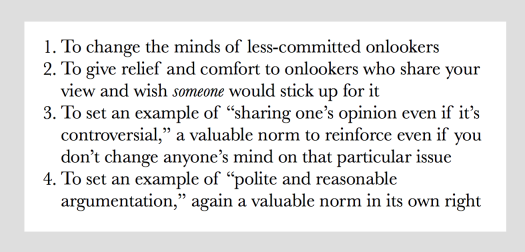C’mon, not all disagreements are opportunities to change your own mind
Yesterday I tweeted about some of the reasons I engage in online arguments with people, even if there’s no real hope of swaying them:

The most common objection I got was this: “You didn’t mention the motivation of changing your own mind. Shouldn’t you always be approaching arguments with open-minded curiosity, motivated by a desire to learn?”
This is kind of a funny thing for me to be pushing back on, since I so often write and speak about the virtues of trying to change your own mind. But I want to push back on it anyway.
I think that “trying to change your mind” is a great goal we should be striving for, but that most debates have a pretty low probability of succeeding at that, and we shouldn’t pretend otherwise. Here are some examples to illustrate the difference:
1) Arguments I engage with in hopes of changing my own mind
Arguments that sound wrong, but the person making them seems smart and intellectually honest, so maybe I’m missing somethingArguments that sound wrong but were shared approvingly by people whose judgment I respectNovel arguments I haven’t heard before, that sound wrong on first pass but are interesting and worth considering more2) Arguments I probably just wouldn’t bother with, if my main goal was changing my own mind
Arguments I’ve already heard a bunch of timesArguments that seem obviously fallacious, and there’s nothing promising about the source to suggest I might be missing somethingArguments by someone who gives signs of being a bad thinker. For example, if they’re being rude and twisting other people’s words uncharitably, that’s not an encouraging sign that I can learn from themArguments by people who don’t share some of my core premises (like, I’m secular and they’re making a religious argument about ethics)What I was trying to do in my tweet yesterday was talk about why I still sometimes engage with arguments in category (2). Of course I strongly endorse seeking out debates in category (1), for the purpose of changing your own mind, and I talk about that a lot. I just hadn’t seen anyone making a good case for why (2) could also be a worthwhile use of time, and I thought that was the more interesting point to highlight.
Also… I strongly suspect that when we insist, “You should always be open to changing your mind!” we just end up undermining our own case. Because when we say that, people think of arguments in category (2), and our lofty rhetoric about changing your mind just seems naive at best, disingenuous at worst. Like, you tell people “Remember, a disagreement is an opportunity to learn!” …and they think of that person in their Facebook feed yelling “Trump kicks ass and we should deport all brown people,” and they inwardly roll their eyes at you.
Instead I’d rather tell people, “You should put some effort into changing your own mind, and here are a few tips on how to find arguments that might have a chance at doing so.” Those won’t be the majority of arguments. But if you’re finding arguments in category (1) even a small fraction of the time, you’re already doing amazingly well.
Julia Galef's Blog
- Julia Galef's profile
- 277 followers



